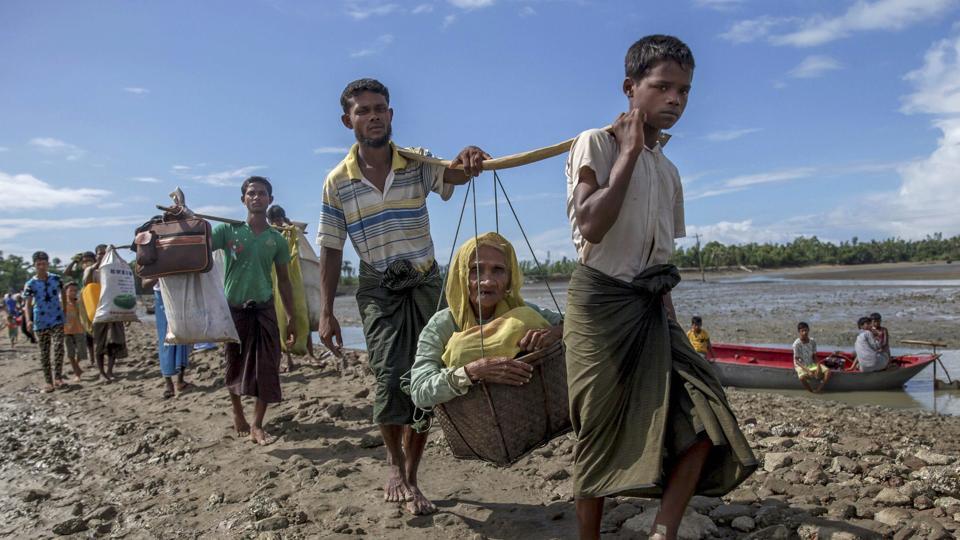
By Rajashree Ghosh
INDIA New England Columnist
The memory of our roots as immigrants and refugees are often relegated to the pages of history, yet facets of the process persist and define our perspectives. In India, the Partition and forming of two nations was followed by violence and the death toll ranged from 200,000 to two million. Millions of people moved to what they hoped would be safer territory, with Muslims heading towards Pakistan, and Hindus and Sikhs in the direction of India. As many as 14-16m people may have been eventually displaced, travelling on foot, in bullock carts and by train.

We did emerge from that dark, violent time and developed as nations, as independent states with citizens who are thriving members. We inherited the sense of loss even as we formed or became part of newer communities, there is an imminent need to belong and become contributing members of the “host” society.
The parallels in experience of being “refugees” whether one has been through Partition, or the humanitarian crisis in Syria, and currently the Rohingyas of Myanmar, is uncannily similar though contexts are vastly different. Massive humanitarian crises occur because of a well-founded fear of persecution. And the process is fraught with violence and an uncertain future. This is in strong contrast with immigrants crossing borders peacefully aiming at bettering one’s economic and career prospects and so much is lost for those whose journey is not as peaceful.
Having been through immigration processes in the United States, I began to examine some of the laws governing immigrants and refugees currently in India. I was surprised to note that India does not have a separate law to govern refugees. In the absence of such a specific law, all existing Indian laws like The Criminal Procedure Code, The Indian Penal Code, The Evidence Act etc. apply to the refugees as well. India is not a signatory to the Convention on Refugees (1951) but affirms the Universal Declaration of Human Rights. So, when it has in the past assisted refugees from Sri Lanka (Tamils) and “genuine” refugees from Myanmar, it has done so on the basis of human rights issues that are guaranteed to citizens and non-citizens.
In 2014, the UN Refugee agency counted more than 2 million people as refugees living in India. They arrived during peak migration crises and conflicts, including partition in 1947, the Tibet crisis of 1959, the creation of Bangladesh 1971, civil wars in Sri Lanka and wars in Afghanistan. Currently refugees have arrived from countries such as Congo, Eritrea, Iran, Iraq, Nigeria, Rwanda, Somalia, Rwanda, Somalia.
Nevertheless, it remains puzzling that a more defined set of laws on refugees is not available. What has now emerged is a new strategy that proposed amending the Citizenship Act of 1955 and make the naturalization process easier – the one caveat being that it does not apply to displaced persons of Muslim faith. This entails that the bill would certainly benefit people belonging to Buddhist, Christian, Hindu, Jain, Zoroastrian and Sikh faith, which are considered minority religions in their countries of origin, such as Afghanistan, Bangladesh, and Pakistan, but not Muslims persecuted in their countries of origin.
Given the context, it makes things clearer as we try and understand India’s stance on the Rohingyas of Myanmar. Myanmar’s Rakhine state is home to just over a million Rohingya, a predominantly Muslim ethnic minority who have faced decades of state-sponsored discrimination and violence. They have for years been denied the right to a nationality under the discriminatory 1982 citizenship law and its application, and suffer severe restrictions on freedom of movement and access to healthcare, education and livelihood opportunities. An estimated 389,000 Rohingya, have fled since the latest bout of violence erupted in northern Rakhine state on August 2017.
Nationalists in India argue that the Rohingyas arrived in an over-crowded India through Bangladesh, settled across the north-eastern states, are “illegal aliens” and are engaging in terrorist activities. Following that sentiment and based on the new amendment India’s Home Ministry has suggested that the 40,000 Rohingyas in India, and those who may potentially enter the country, pose a “national security” threat and that they need to be deported.
What complicates this approach is that that Burmese nationalists and Buddhist hardliners share similar sentiments with the current Indian government closer to their line of thinking when it comes to Muslims and are thus connected through religious appeal. A BBC report goes into details of of several infrastructure projects that India is building in Rakhine – the province where Rohingyas belong.
In any case through its planned lack of clarity in refugee law, India is able to work the fuzziness to its political advantage where refugees are concerned. In stigtmatizing the Rohingyas there is complete denial of their suffering and history of persecuted and current plight.
Human rights lawyers have questioned the government to provide proof of “threat” and both sides are arguing their respective cases in Supreme Court. It has certainly shaken up the national conscience and people on both sides of the argument have voiced loud opinions.
Internationally, countries are trying to put pressure on Myanmar to stop the “ethnic cleansing” and military operations so that this humanitarian nightmare can end. While Myanmar has denied any wrong doing and is even silent on many of the concerns, countries such as Australia and United Kingdom have offered refuge.
Sometimes history is left way in the past and memory of those years in India that emerged out of Partition and its violent aftermath are fading. There were some valuable lessons of harmony and kindness that could inspire the directives in the country. Instead of stigmatizing, embracing new residents might be an option worth considering. And standardizing processes that reduce human suffering can only benefit nation building.
(Rajashree Ghosh is a Resident Scholar at Women’s Studies Research Center at Brandeis University.)












